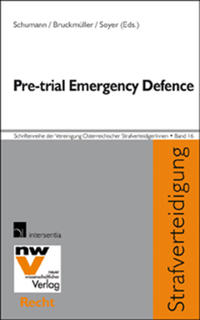
Access to legal advice already pre-trial is an essential element of the fair trial principle. It is widely acknowledged that pre-trial proceedings often predetermine the outcome of the whole proceedings. The European Court of Human Rights has just recently held that “Having been denied legal assistance, the applicant was unable to make the correct assessment of the consequences his decision to confess would have on the outcome of the criminal case […]. In the absence of assistance by counsel who could have provided legal advice and technical skills, the applicant could not make full and knowledgeable use of his rights afforded by the criminal-procedural law.” (ECtHR 24/09/2009 Pishchalnikov v. Russia appl. no. 7025/04 § 85). Based on a two years research study, focusing on defence rights during the pre-trial criminal proceedings - best practice and effective lawyer emergency services, this book explores the factors influencing the suspect's decision whether to access legal advice pre-trial or to waive this right. It explains the decisive influence of whether and how the suspect will be provided information on his rights. It demonstrates that suspects tend to underestimate the importance of pre-trial proceedings. It covers factors such as the costs of legal advice and legal representation as well as the availability of legal aid already pre-trial. It evaluates pre-trial access to defence rights not just in law but also in practice, focusing especially on the effectiveness of emergency lawyer schemes as a practical tool to facilitate access to effective legal advice. Based on the findings of the "Pre-trial Emergency Defence (PED)" project on pre-trial access to defence rights in Austria, Croatia, Germany and Slovenia, the book provides conclusions and recommendations on how to improve pre-trial access to legal advice - by taking both legal and practical measures.